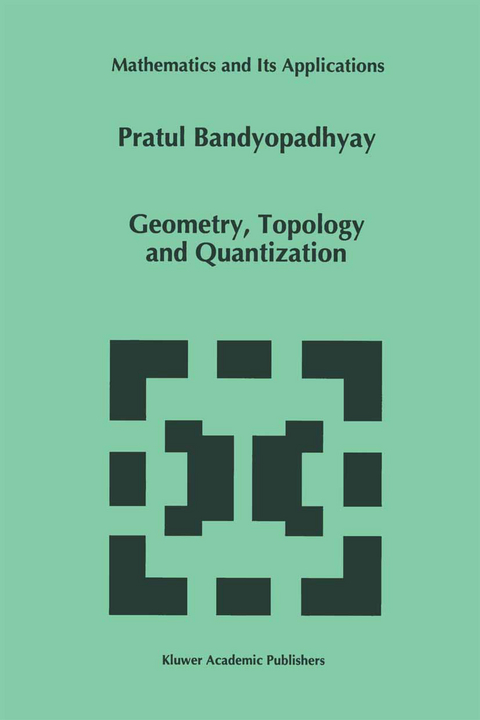
Geometry, Topology and Quantization
Seiten
1996
Springer (Verlag)
978-0-7923-4305-9 (ISBN)
Springer (Verlag)
978-0-7923-4305-9 (ISBN)
This is a monograph on geometrical and topological features which arise in various quantization procedures. When this internal space variable is considered as a direc tion vector introducing an anisotropy in the internal space, we have the quantization of a Fermi field.
This is a monograph on geometrical and topological features which arise in various quantization procedures. Quantization schemes consider the feasibility of arriving at a quantum system from a classical one and these involve three major procedures viz. i) geometric quantization, ii) Klauder quantization, and iii) stochastic quanti zation. In geometric quantization we have to incorporate a hermitian line bundle to effectively generate the quantum Hamiltonian operator from a classical Hamil tonian. Klauder quantization also takes into account the role of the connection one-form along with coordinate independence. In stochastic quantization as pro posed by Nelson, Schrodinger equation is derived from Brownian motion processes; however, we have difficulty in its relativistic generalization. It has been pointed out by several authors that this may be circumvented by formulating a new geometry where Brownian motion proceses are considered in external as well as in internal space and, when the complexified space-time is considered, the usual path integral formulation is achieved. When this internal space variable is considered as a direc tion vector introducing an anisotropy in the internal space, we have the quantization of a Fermi field. This helps us to formulate a stochastic phase space formalism when the internal extension can be treated as a gauge theoretic extension. This suggests that massive fermions may be considered as Skyrme solitons. The nonrelativistic quantum mechanics is achieved in the sharp point limit.
This is a monograph on geometrical and topological features which arise in various quantization procedures. Quantization schemes consider the feasibility of arriving at a quantum system from a classical one and these involve three major procedures viz. i) geometric quantization, ii) Klauder quantization, and iii) stochastic quanti zation. In geometric quantization we have to incorporate a hermitian line bundle to effectively generate the quantum Hamiltonian operator from a classical Hamil tonian. Klauder quantization also takes into account the role of the connection one-form along with coordinate independence. In stochastic quantization as pro posed by Nelson, Schrodinger equation is derived from Brownian motion processes; however, we have difficulty in its relativistic generalization. It has been pointed out by several authors that this may be circumvented by formulating a new geometry where Brownian motion proceses are considered in external as well as in internal space and, when the complexified space-time is considered, the usual path integral formulation is achieved. When this internal space variable is considered as a direc tion vector introducing an anisotropy in the internal space, we have the quantization of a Fermi field. This helps us to formulate a stochastic phase space formalism when the internal extension can be treated as a gauge theoretic extension. This suggests that massive fermions may be considered as Skyrme solitons. The nonrelativistic quantum mechanics is achieved in the sharp point limit.
1 Manifold and Differential Forms.- 2 Spinor Structure and Twistor Geometry.- 3 Quantization.- 4 Quantization And Gauge Field.- 5 Fermions and Topology.- 6 Topological Field Theory.- References.
| Reihe/Serie | Mathematics and Its Applications ; 386 | Mathematics and Its Applications ; 386 |
|---|---|
| Zusatzinfo | X, 230 p. |
| Verlagsort | Dordrecht |
| Sprache | englisch |
| Maße | 155 x 235 mm |
| Themenwelt | Mathematik / Informatik ► Mathematik ► Angewandte Mathematik |
| Naturwissenschaften ► Physik / Astronomie ► Allgemeines / Lexika | |
| Naturwissenschaften ► Physik / Astronomie ► Quantenphysik | |
| Naturwissenschaften ► Physik / Astronomie ► Theoretische Physik | |
| ISBN-10 | 0-7923-4305-0 / 0792343050 |
| ISBN-13 | 978-0-7923-4305-9 / 9780792343059 |
| Zustand | Neuware |
| Haben Sie eine Frage zum Produkt? |
Mehr entdecken
aus dem Bereich
aus dem Bereich
Buch | Hardcover (2012)
Westermann Schulbuchverlag
34,95 €
Schulbuch Klassen 7/8 (G9)
Buch | Hardcover (2015)
Klett (Verlag)
30,50 €
Buch | Softcover (2004)
Cornelsen Verlag
25,25 €



